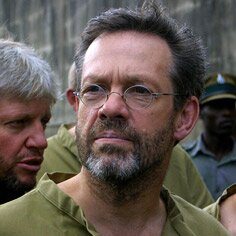|
HUMAN RIGHTS FOR EACH PERSON REGARDLESS OF AGE, RACE, RELIGION OR POLITICS
|
 |
|
|

|
|
LATEST NEWS
|
|
Mann set to go free
|
 Jailed mercenary Simon Mann’s hopes for freedom have received a boost after judges in Zimbabwe put his extradition case on hold. Jailed mercenary Simon Mann’s hopes for freedom have received a boost after judges in Zimbabwe put his extradition case on hold.
The former SAS soldier is in custody in Chikurubi prison awaiting extradition to Equatorial Guinea for his part in a failed coup three years ago.
Friends fear that if he is handed over to one of the most brutal regimes in Africa it will be an effective death sentence. But when Mann’s case came before the Zimbabwean high court last week, it was delayed by judges on the grounds that it was not urgent.
His lawyers say he is suffering complications from a hernia but the government has so far rejected his request for an operation.
State prosecutor Joseph Jagada said that justice minister Patrick Chinamasa had rejected pleas that there was an urgent need for Mann to undergo surgery.
Mr Jagada said the judgment was not based on any medical examination but on the fact that Mann was said to be in urgent need of treatment six months ago but nothing adverse had yet happened to him.
Government lawyers told the court that Mann should be extradited, adding that the crime that Equatorial Guinea intends to have him charged for is also punishable under Zimbabwean law.
“The evidence tendered by Equatorial Guinea would constitute a prima facie case under the security law, POSA (Public Order and Security Act),” said Mr Jagada.
Mann’s lawyer, Jonathan Samkange, urged the court to set aside a lower court’s decision to extradite Mann. He called on the two judges to order Mann’s immediate release, saying he had now served his three-year prison term for arms possession and that his continued detention was now illegal.
Mann was released in May at the end of his sentence but was immediately re-arrested on an immigration warrant.
Mr Samkange said a magistrate issued a detention order but was in breach of the law because it came without a warrant.
The judges advised him to file a separate application on the matter and he agreed to do so on Tuesday.
Earlier he had told of the stress that Mann was suffering as a result of his continued detention.
He appealed to the court to prevent the extradition, arguing the move would amount to a death sentence.
“A ruling by a magistrate in May that Simon Mann should be extradited to Malabo would lead to him being tortured and denied treatment for a hernia that would end up killing him,” he said.
“He is so ill he should not be extradited. He will not be able to withstand trial. Equatorial Guinea does not send its prisoners for treatment. It only allows doctors to visit inmates. If he is sent, it will be like he is being sent to die.”
Mr Samkange argued that Zimbabwe was obliged to turn down the extradition request on the grounds that Mann was likely to be tortured in order to confess his role in the alleged 2004 coup plot against President Teodoro Obiang Nguema.
Mr Samkange said: “Zimbabwe is a member of the international community and international law imposes an obligation on Zimbabwe to prohibit extradition of a person to a country, where they are likely to face torture or cruel and degrading treatment. It is clear that Zimbabwe, being part of the United Nations and African Union, is obliged not to extradite the appellant. Not doing that would be to offend the established norms.”
Mann is being held after completing a jail term for an arms offence under Zimbabwean law related to the alleged coup plot.
He was arrested with 61 others after their plane landed at Harare airport in March 2004.
They were accused of stopping off to pick up weapons from Harare while on their way to Malabo in Equatorial Guinea to oust Nguema, who had ruled the West African state with an iron fist since 1979.
Mann said he and his co-accused were on their way to the Democratic Republic of Congo and needed the weapons for a security contract at a mine.
The son of Baroness Thatcher, Mark Thatcher admitted his role in the failed coup and the Cape Town high court ordered him to pay a 3million rand (£265,000) fine and gave him a four-year suspended prison sentence.
Thatcher, 51, admitted to paying for a military helicopter used by the mercenaries in the plot but maintained that he believed it was to be used as an air ambulance.
The hearing in Mann’s case will continue on a date to be advised.
|
| CLICK HERE TO RETURN TO THE NEWS PAGE |
|
|
FREEDOM IS A RIGHT OF ALL HUMAN BEINGS IN A WORLD WHERE LIFE IS VALUED AND PEACE MAY FINALLY BE A POSSIBILITY
|
|
|
|
|

|
| Just in case you forgot - read the Universal declaration of Human Rights |
|
|


 Jailed mercenary Simon Mann’s hopes for freedom have received a boost after judges in Zimbabwe put his extradition case on hold.
Jailed mercenary Simon Mann’s hopes for freedom have received a boost after judges in Zimbabwe put his extradition case on hold.


